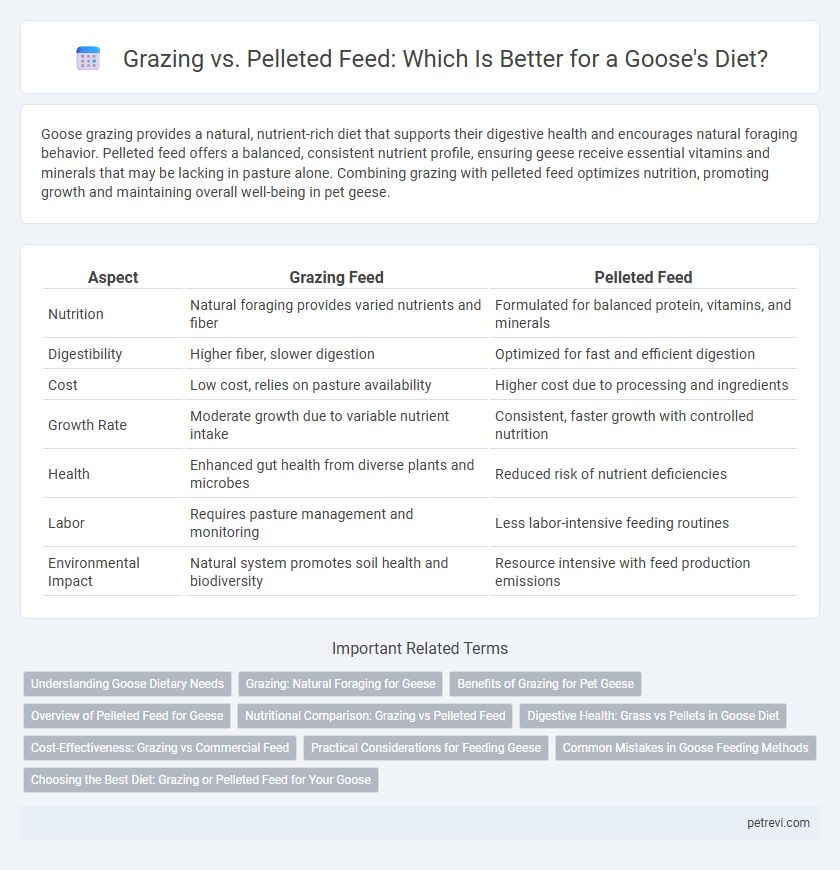Goose grazing provides a natural, nutrient-rich diet that supports their digestive health and encourages natural foraging behavior. Pelleted feed offers a balanced, consistent nutrient profile, ensuring geese receive essential vitamins and minerals that may be lacking in pasture alone. Combining grazing with pelleted feed optimizes nutrition, promoting growth and maintaining overall well-being in pet geese.
Table of Comparison
| Aspect | Grazing Feed | Pelleted Feed |
|---|---|---|
| Nutrition | Natural foraging provides varied nutrients and fiber | Formulated for balanced protein, vitamins, and minerals |
| Digestibility | Higher fiber, slower digestion | Optimized for fast and efficient digestion |
| Cost | Low cost, relies on pasture availability | Higher cost due to processing and ingredients |
| Growth Rate | Moderate growth due to variable nutrient intake | Consistent, faster growth with controlled nutrition |
| Health | Enhanced gut health from diverse plants and microbes | Reduced risk of nutrient deficiencies |
| Labor | Requires pasture management and monitoring | Less labor-intensive feeding routines |
| Environmental Impact | Natural system promotes soil health and biodiversity | Resource intensive with feed production emissions |
Understanding Goose Dietary Needs
Geese require a diet rich in fiber and nutrients, which natural grazing provides through grass and aquatic plants, supporting their digestive health and natural behavior. Pelleted feed offers a balanced blend of essential vitamins, minerals, and proteins, ensuring consistent nutrition especially when grazing is limited or unavailable. Combining grazing with pelleted feed optimizes nutrient intake, promotes growth, and maintains overall health in domestic and farmed geese.
Grazing: Natural Foraging for Geese
Grazing allows geese to engage in natural foraging behavior, consuming a diverse range of grasses, herbs, and insects that support optimal digestive health and nutrient absorption. This diet increases intake of fiber and essential micronutrients such as carotenoids and omega-3 fatty acids, which are less prevalent in pelleted feed. Studies show that geese grazing in pasture environments exhibit improved weight gain and immune function compared to those solely fed on commercial pellets.
Benefits of Grazing for Pet Geese
Grazing offers pet geese a natural, nutrient-rich diet high in fiber and essential vitamins that supports optimal digestion and overall health. Access to fresh grasses and insects promotes natural foraging behavior, enhancing mental stimulation and preventing obesity common in pelleted feed-only diets. This natural diet also reduces risks of nutrient imbalances and digestive disorders often associated with processed feeds, improving longevity and vitality in pet geese.
Overview of Pelleted Feed for Geese
Pelleted feed for geese offers a nutritionally balanced diet formulated to meet their specific energy, protein, and mineral requirements, ensuring consistent intake and reducing feed wastage. This type of feed supports optimal growth, feather quality, and overall health by providing uniform particle size that encourages efficient digestion. Pelleted feed also minimizes selective feeding behavior common in grazed diets, promoting stable nutrient absorption and improved flock performance.
Nutritional Comparison: Grazing vs Pelleted Feed
Grazing provides geese with a natural diet rich in fiber, vitamins, and minerals essential for optimal growth, while pelleted feed offers a balanced, consistent nutrient profile tailored to support rapid weight gain and overall health. Grazed forage contains varied phytochemicals and antioxidants that enhance immune function, whereas pelleted feed delivers precise protein and energy ratios to meet specific dietary requirements. Nutritional analysis shows grazing tends to be lower in concentrated energy but higher in micronutrients, contrasting with pelleted feed's formulation for efficiency and uniform nutrient supply.
Digestive Health: Grass vs Pellets in Goose Diet
Grass in a goose's diet promotes natural foraging behavior and provides high fiber content essential for healthy digestion and gut motility. Pelleted feed offers a balanced nutrient profile with controlled protein and energy levels, reducing the risk of dietary imbalances but may lack the fiber diversity found in fresh forage. A diet combining both grass and pelleted feed supports optimal digestive health by ensuring proper nutrient intake and maintaining gut flora balance.
Cost-Effectiveness: Grazing vs Commercial Feed
Grazing offers a highly cost-effective diet for geese by utilizing natural forage, significantly reducing the expense of purchased feed. Commercial pelleted feed provides balanced nutrition but incurs higher costs due to processing and packaging. Farmers often find integrating grazing with supplemental pelleted feed optimizes both nutrition and overall feeding costs.
Practical Considerations for Feeding Geese
Grazing offers geese a natural diet rich in varied grasses, promoting optimal digestion and nutrient absorption, while pelleted feed provides a controlled, balanced nutrient profile ensuring consistent growth and health. Managing pasture quality and rotational grazing is essential to prevent overgrazing and maintain forage availability, whereas pelleted feed simplifies portion control and reduces the risk of dietary deficiencies. Practical feeding strategies often combine grazing with supplemental pelleted feed to optimize energy intake and support geese during periods of limited pasture access or higher nutritional demands.
Common Mistakes in Goose Feeding Methods
Overfeeding pelleted feed often leads to obesity and poor digestion in geese, as it lacks the natural fiber found in grazing. Many keepers mistakenly rely solely on pellets, neglecting the essential nutrients and exercise derived from fresh pasture grazing. Proper balance between grazing and pellets ensures optimal health, improved growth, and prevents common issues like vitamin deficiencies and digestive disorders.
Choosing the Best Diet: Grazing or Pelleted Feed for Your Goose
Grazing provides geese with natural foraging behavior, access to diverse nutrients, and improved gut health, promoting overall well-being and reduced feed costs. Pelleted feed ensures a balanced, nutrient-dense diet with consistent protein, vitamins, and minerals, supporting optimal growth and egg production. Selecting the best diet depends on availability, management style, and specific health goals of the goose, balancing natural foraging benefits with nutritional precision.
Grazing vs Pelleted Feed for Goose Diet Infographic

 petrevi.com
petrevi.com